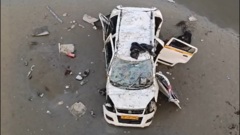A tragic accident in India is igniting a fierce debate about the role of navigation apps like Google Maps in ensuring user safety. Three men tragically lost their lives when the car they were traveling in veered off an unfinished bridge and fell onto a riverbed in Uttar Pradesh. Reports indicate that the bridge had partially collapsed earlier due to flooding, a fact locals were aware of, but the victims were not, as they originated from outside the area.
Police investigations suggest Google Maps directed the men onto the dangerous road, leading to a police complaint against four engineers from the state's road department and an unnamed Google Maps official, citing culpable homicide. A Google spokesperson stated the company is cooperating with the investigation.
The incident has highlighted the dire state of road infrastructure in India and raised questions regarding the responsibilities of navigation applications in guiding users accurately. Critics argue that Google Maps failed to provide timely and precise information about the hazards, while advocates for the app contend that the onus to be cautious lies with the users, particularly when warnings about road conditions are not universally applicable.
With approximately 60 million active users in India, Google Maps remains the most widely used navigation tool, powering many local services, including ride-sharing and food delivery. However, its track record is marred by previous incidents, including several fatal accidents linked to incorrect directions provided by the app.
Experts suggest that the challenges faced by Google Maps in India stem from a lack of real-time data regarding road changes, compounded by India's rapid growth and infrastructure challenges. The absence of a robust system for reporting and updating infrastructural issues means navigation platforms struggle to maintain accurate mapping.
Legal perspectives on the matter are split. Some lawyers argue that Google Maps, as an 'intermediary' under India's IT Act, is protected from liability. However, if it can be shown the app disregarded vital information about road safety, there is a potential for legal accountability.
The tragic accident underscores the urgent need for improved infrastructure, better communication of road conditions, and a more accountable digital mapping framework to protect users on the roads of India.




















